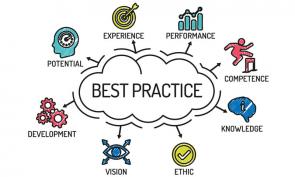
The need to maximize current year profits requires a short-term management perspective, focusing on pushing every possible dollar to the bottom line via aggressive cost cutting, which may include layoffs. Declining profits, when made public in the press, have a negative impact on recruiting, attorney retention, and the firm's image - even when the decline represents a short-term investment needed to achieve long-term objectives.
The need to position the firm for the next rise in the business cycle requires a long-term perspective, with the goal of having the required resources on hand when client demand rebounds. To carry those resources through a downturn will hurt current profits, but the firm will reap benefits later, and the cost of carrying such expertise may be far less than the cost of recruiting and training to add expertise when needed in the future.
Complicating both goals are the increases in compensation bestowed upon associates over the past few years. Even though these increases were driven by a short-term demand for associates, they will have a long-term impact. Demand is currently down, but compensation cannot be decreased commensurately without sparking a mutiny and a public relations nightmare. Salary costs will stabilize for a few years, and bonus pools tied to firmwide profitability will adjust accordingly. Performance-based bonuses may have to be revisited to ensure that the firm is benefiting economically from the rewarded activities.
Generally speaking, the more emphasis placed on the long-term perspective, the better the plan will be. Many firms responded to the recession with short-sighted, reactive tactics. They terminated associates in large numbers and tried to save money by cutting training and mentoring programs. In subsequent years, these firms were left with experience gaps that were ultimately very expensive and difficult to fill. It is clear, however, that less-profitable firms need to focus on short-term profits to remain competitive. Healthier firms have the luxury of investing in themselves and taking a longer view.
Many factors must be considered when determining the appropriate balance between these conflicting goals, including profitability, stability of the partnership and the client base, future demand predictions, and firm culture. A specific plan of action should be developed to end the year at an acceptable profitability level while maintaining the desired resources. Implementing the plan will likely require use of one or more of the following tactics.
If the plan emphasizes the long-term perspective, and underproductive staff (in billable terms) will be carried through a downturn with the associated impact to profits, then the firm must optimize its resources via one or more of the following tactics:
- Reallocate resources where possible. The firm is best served when all of its resources are busy and the boundaries between practice groups blur somewhat. A busy practice group that requires assistance-particularly short-term assistance - should look internally to make sure that its resource needs are not available within another group prior to going outside the firm (via hiring or temps) for assistance. Reallocating works particularly well with more-junior lawyers.
- Maximize the value of nonbillable time. The total value of nonbillable time (number of hours times standard rates) is significant in most firms. The general perception of such time, however, is that it represents unproductive hours and lost revenue.
- Increase your pro bono workload. Pro bono cases can be challenging, educational, and personally rewarding. Pro bono involvement is not only very important to today's young associates, but it is beneficial to the community and to the firm's standing therein.
- Continue to delegate work to the appropriate level. When business slows, partners sometimes hoard some associate-level work in order to stay busy-particularly in firms that reward billable hours. This scenario ties up partner time that should be devoted to client development, creates angst among idle associates, and can create billing write-offs due to unhappy clients resisting higher fees for work that used to be done more efficiently.
- Advise junior attorneys on how long projects should take. This helps protect against a natural tendency: as people become less busy, they may become less efficient. This scenario will also lead to billing write-offs.
If the plan emphasizes the short-term perspective, and underproductive staff (in billable terms) will be terminated, then the firm must make the best choices on whom to release using one or more of the following tactics:
- Make terminations where they are most effective, not where they are the easiest. Law firm leaders who face overcapacity typically terminate at the least politically challenging level—the junior associate ranks. This approach tends to create experience gaps that typically require filling via lateral hiring later on. The most effective cuts are made by examining underperformers at all ranks and making terminations across the board - including partners. While some argue that an aggressive approach is contrary to firm culture or to the concept of a partnership, all should realize the ultimate cost of preserving culture by maintaining underproductive partners: the highly productive partners will grow weary of others riding on their coattails and will leave.
- Think long term - even within a short-term perspective. If you have employees who are contributing nicely today but don't have a long-term future within the firm—their practice may not fit the long-term strategy; they do not meet all criteria for partner and will ultimately become marginal fiscal contributors due to high compensation levels; etc.—then make those determinations and terminations earlier rather than later. This will serve both the individual and the firm. The individual benefits by having better odds of catching on somewhere else, and the firm benefits by eliminating future problems early and by being in the position to hire/develop staff that fit in the firm's long-term plans.
- Staff for the lower levels of the business cycle-not the peaks. This is much more healthy than alternating between hiring frenzies and big layoffs. You can fill the undercapacity with overtime, temporary workers, and shifts among practice groups. Overcapacity can be filled with productive nonbillable activities and increased pro bono work.
- Proactively manage capacity. The amount of available time from service providers such as attorneys generally meets the demand from the clients in a profitable and efficient manner. Taken one step further, the concept of proactive capacity management requires periodic (biweekly or monthly) workload forecasts from all timekeepers. From these forecasts, practice group leaders can balance workloads, identify pending slack periods, and take corrective actions ahead of time.
- Continue hiring and cull from the senior ranks. The influx of talent must never be stopped. It can be slowed or accelerated somewhat, but a halt in the process creates an experience gap in the firm's staff that becomes more problematic when laterals are required. This influx also forces firm management to continually evaluate the more senior resources vis—vis the firm's direction and strategy.
- Align the associate compensation system with the firm's goals. In many instances, this simply means keeping pace with the market. There are, however, more cutting-edge ideas, including tying associate bonuses to firm profits-at least in part. Individual bonuses that reward hours promote individualistic behavior. Bonuses that place the firm's interests first will change the associates' perspectives toward their role and, particularly, their use of nonbillable time.
Finding the balance between the firm's short-term and long-term needs will be one of the most challenging and important management tasks in the fourth quarter of 2001. Be proactive as you guide your firm through the current downturn in business and prepare for 2002. The economy is a cycle, and you need to position your firm to be in an optimal competitive position both at year's end and when business rebounds.
|
How to Hire a Legal Recruiter for Your Law Firm: How Law Firms Recruit Attorneys Using Legal Recruiters |
About Harrison Barnes
No legal recruiter in the United States has placed more attorneys at top law firms across every practice area than Harrison Barnes. His unmatched expertise, industry connections, and proven placement strategies have made him the most influential legal career advisor for attorneys seeking success in Big Law, elite boutiques, mid-sized firms, small firms, firms in the largest and smallest markets, and in over 350 separate practice areas.
A Reach Unlike Any Other Legal Recruiter
Most legal recruiters focus only on placing attorneys in large markets or specific practice areas, but Harrison places attorneys at all levels, in all practice areas, and in all locations-from the most prestigious firms in New York, Los Angeles, and Washington, D.C., to small and mid-sized firms in rural markets. Every week, he successfully places attorneys not only in high-demand practice areas like corporate and litigation but also in niche and less commonly recruited areas such as:
- Immigration Law
- Workers Compensation
- Insurance
- Family Law
- Trust and Estate
- Municipal law
- And many more...
This breadth of placements is unheard of in the legal recruiting industry and is a testament to his extraordinary ability to connect attorneys with the right firms, regardless of market size or practice area.
Proven Success at All Levels
With over 25 years of experience, Harrison has successfully placed attorneys at over 1,000 law firms, including:
- Top Am Law 100 firms such including Sullivan and Cromwell, and almost every AmLaw 100 and AmLaw 200 law firm.
- Elite boutique firms with specialized practices
- Mid-sized firms looking to expand their practice areas
- Growing firms in small and rural markets
He has also placed hundreds of law firm partners and has worked on firm and practice area mergers, helping law firms strategically grow their teams.
Unmatched Commitment to Attorney Success - The Story of BCG Attorney Search
Harrison Barnes is not just the most effective legal recruiter in the country, he is also the founder of BCG Attorney Search, a recruiting powerhouse that has helped thousands of attorneys transform their careers. His vision for BCG goes beyond just job placement; it is built on a mission to provide attorneys with opportunities they would never have access to otherwise. Unlike traditional recruiting firms, BCG Attorney Search operates as a career partner, not just a placement service. The firm's unparalleled resources, including a team of over 150 employees, enable it to offer customized job searches, direct outreach to firms, and market intelligence that no other legal recruiting service provides. Attorneys working with Harrison and BCG gain access to hidden opportunities, real-time insights on firm hiring trends, and guidance from a team that truly understands the legal market. You can read more about how BCG Attorney Search revolutionizes legal recruiting here: The Story of BCG Attorney Search and What We Do for You.
The Most Trusted Career Advisor for Attorneys
Harrison's legal career insights are the most widely followed in the profession.
- His articles on BCG Search alone are read by over 150,000 attorneys per month, making his guidance the most sought-after in the legal field. Read his latest insights here.
- He has conducted hundreds of hours of career development webinars, available here: Harrison Barnes Webinar Replays.
- His placement success is unmatched-see examples here: Harrison Barnes' Attorney Placements.
- He has created numerous comprehensive career development courses, including BigLaw Breakthrough, designed to help attorneys land positions at elite law firms.
Submit Your Resume to Work with Harrison Barnes
If you are serious about advancing your legal career and want access to the most sought-after law firm opportunities, Harrison Barnes is the most powerful recruiter to have on your side.
Submit your resume today to start working with him: Submit Resume Here
With an unmatched track record of success, a vast team of over 150 dedicated employees, and a reach into every market and practice area, Harrison Barnes is the recruiter who makes career transformations happen and has the talent and resources behind him to make this happen.
A Relentless Commitment to Attorney Success
Unlike most recruiters who work with only a narrow subset of attorneys, Harrison Barnes works with lawyers at all stages of their careers, from junior associates to senior partners, in every practice area imaginable. His placements are not limited to only those with "elite" credentials-he has helped thousands of attorneys, including those who thought it was impossible to move firms, find their next great opportunity.
Harrison's work is backed by a team of over 150 professionals who work around the clock to uncover hidden job opportunities at law firms across the country. His team:
- Finds and creates job openings that aren't publicly listed, giving attorneys access to exclusive opportunities.
- Works closely with candidates to ensure their resumes and applications stand out.
- Provides ongoing guidance and career coaching to help attorneys navigate interviews, negotiations, and transitions successfully.
This level of dedicated support is unmatched in the legal recruiting industry.
A Legal Recruiter Who Changes Lives
Harrison believes that every attorney-no matter their background, law school, or previous experience-has the potential to find success in the right law firm environment. Many attorneys come to him feeling stuck in their careers, underpaid, or unsure of their next steps. Through his unique ability to identify the right opportunities, he helps attorneys transform their careers in ways they never thought possible.
He has worked with:
- Attorneys making below-market salaries who went on to double or triple their earnings at new firms.
- Senior attorneys who believed they were "too experienced" to make a move and found better roles with firms eager for their expertise.
- Attorneys in small or remote markets who assumed they had no options-only to be placed at strong firms they never knew existed.
- Partners looking for a better platform or more autonomy who successfully transitioned to firms where they could grow their practice.
For attorneys who think their options are limited, Harrison Barnes has proven time and time again that opportunities exist-often in places they never expected.
Submit Your Resume Today - Start Your Career Transformation
If you want to explore new career opportunities, Harrison Barnes and BCG Attorney Search are your best resources. Whether you are looking for a BigLaw position, a boutique firm, or a move to a better work environment, Harrison's expertise will help you take control of your future.
Submit Your Resume Here to get started with Harrison Barnes today.
Harrison's reach, experience, and proven results make him the best legal recruiter in the industry. Don't settle for an average recruiter-work with the one who has changed the careers of thousands of attorneys and can do the same for you.
About BCG Attorney Search
BCG Attorney Search matches attorneys and law firms with unparalleled expertise and drive, while achieving results. Known globally for its success in locating and placing attorneys in law firms of all sizes, BCG Attorney Search has placed thousands of attorneys in law firms in thousands of different law firms around the country. Unlike other legal placement firms, BCG Attorney Search brings massive resources of over 150 employees to its placement efforts locating positions and opportunities its competitors simply cannot. Every legal recruiter at BCG Attorney Search is a former successful attorney who attended a top law school, worked in top law firms and brought massive drive and commitment to their work. BCG Attorney Search legal recruiters take your legal career seriously and understand attorneys. For more information, please visit www.BCGSearch.com.
Harrison Barnes does a weekly free webinar with live Q&A for attorneys and law students each Wednesday at 10:00 am PST. You can attend anonymously and ask questions about your career, this article, or any other legal career-related topics. You can sign up for the weekly webinar here: Register on Zoom
Harrison also does a weekly free webinar with live Q&A for law firms, companies, and others who hire attorneys each Wednesday at 10:00 am PST. You can sign up for the weekly webinar here: Register on Zoom
You can browse a list of past webinars here: Webinar Replays
You can also listen to Harrison Barnes Podcasts here: Attorney Career Advice Podcasts
You can also read Harrison Barnes' articles and books here: Harrison's Perspectives
Harrison Barnes is the legal profession's mentor and may be the only person in your legal career who will tell you why you are not reaching your full potential and what you really need to do to grow as an attorney--regardless of how much it hurts. If you prefer truth to stagnation, growth to comfort, and actionable ideas instead of fluffy concepts, you and Harrison will get along just fine. If, however, you want to stay where you are, talk about your past successes, and feel comfortable, Harrison is not for you.
Truly great mentors are like parents, doctors, therapists, spiritual figures, and others because in order to help you they need to expose you to pain and expose your weaknesses. But suppose you act on the advice and pain created by a mentor. In that case, you will become better: a better attorney, better employees, a better boss, know where you are going, and appreciate where you have been--you will hopefully also become a happier and better person. As you learn from Harrison, he hopes he will become your mentor.
To read more career and life advice articles visit Harrison's personal blog.






